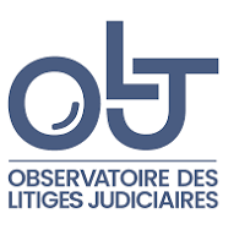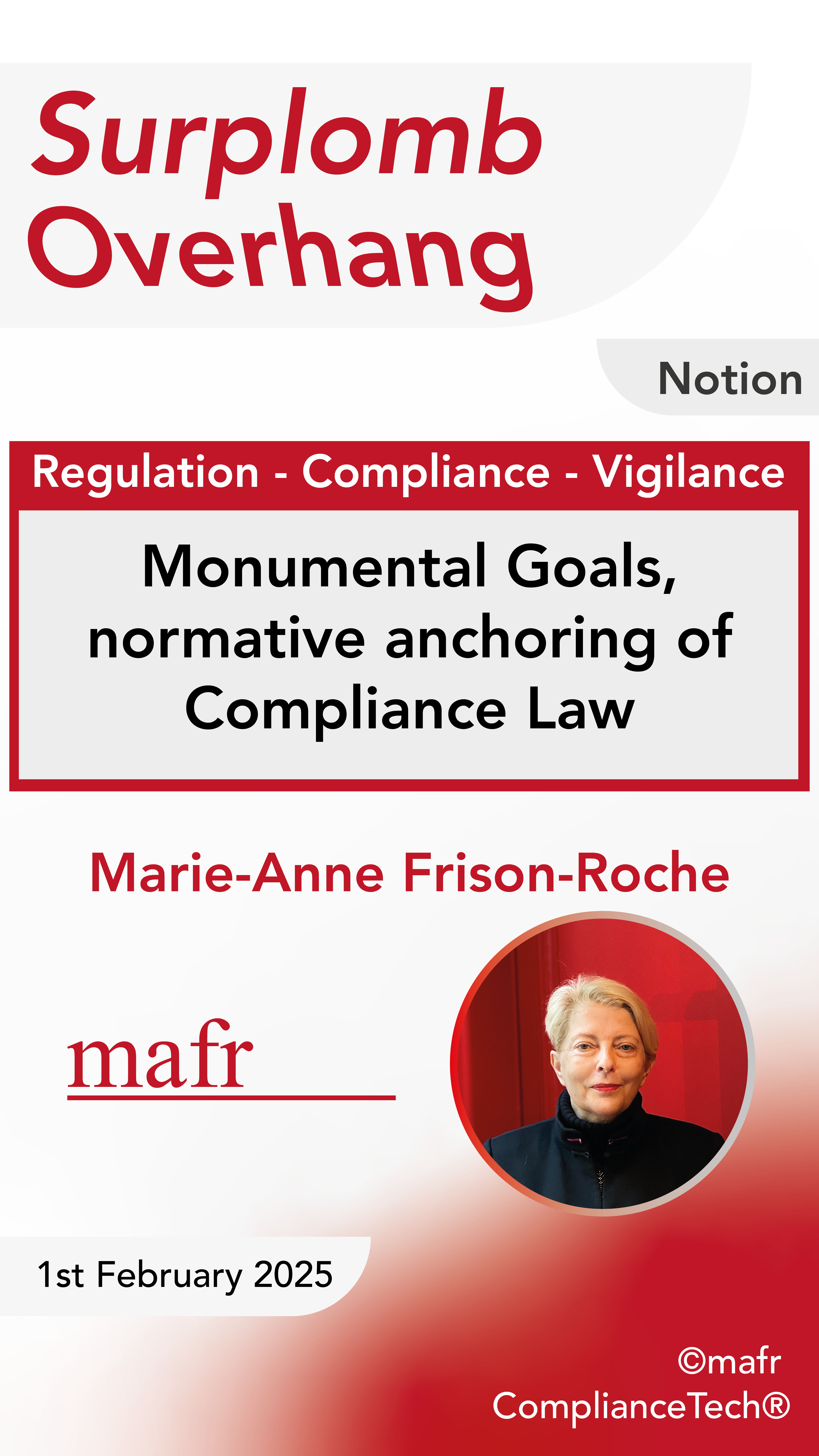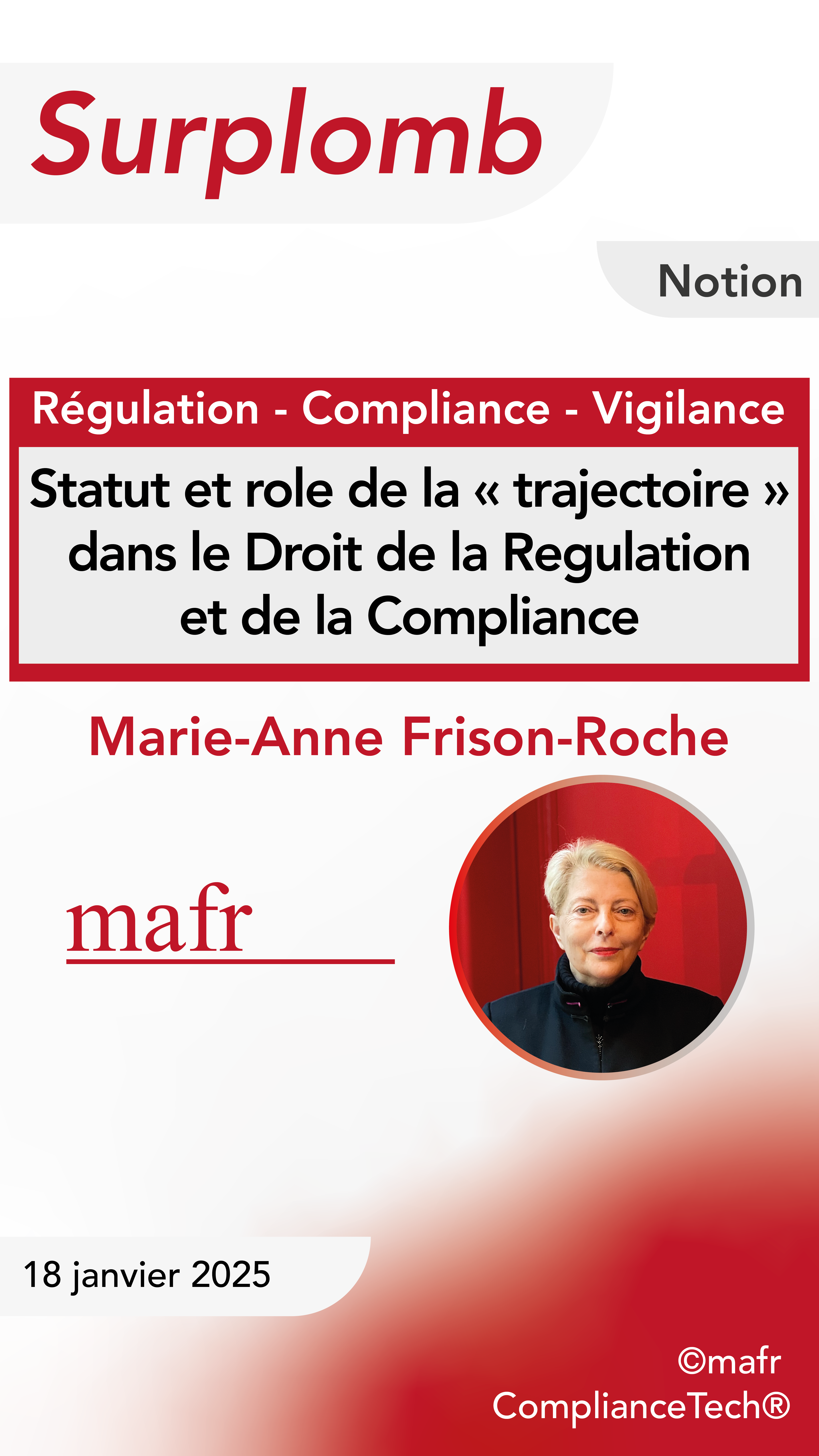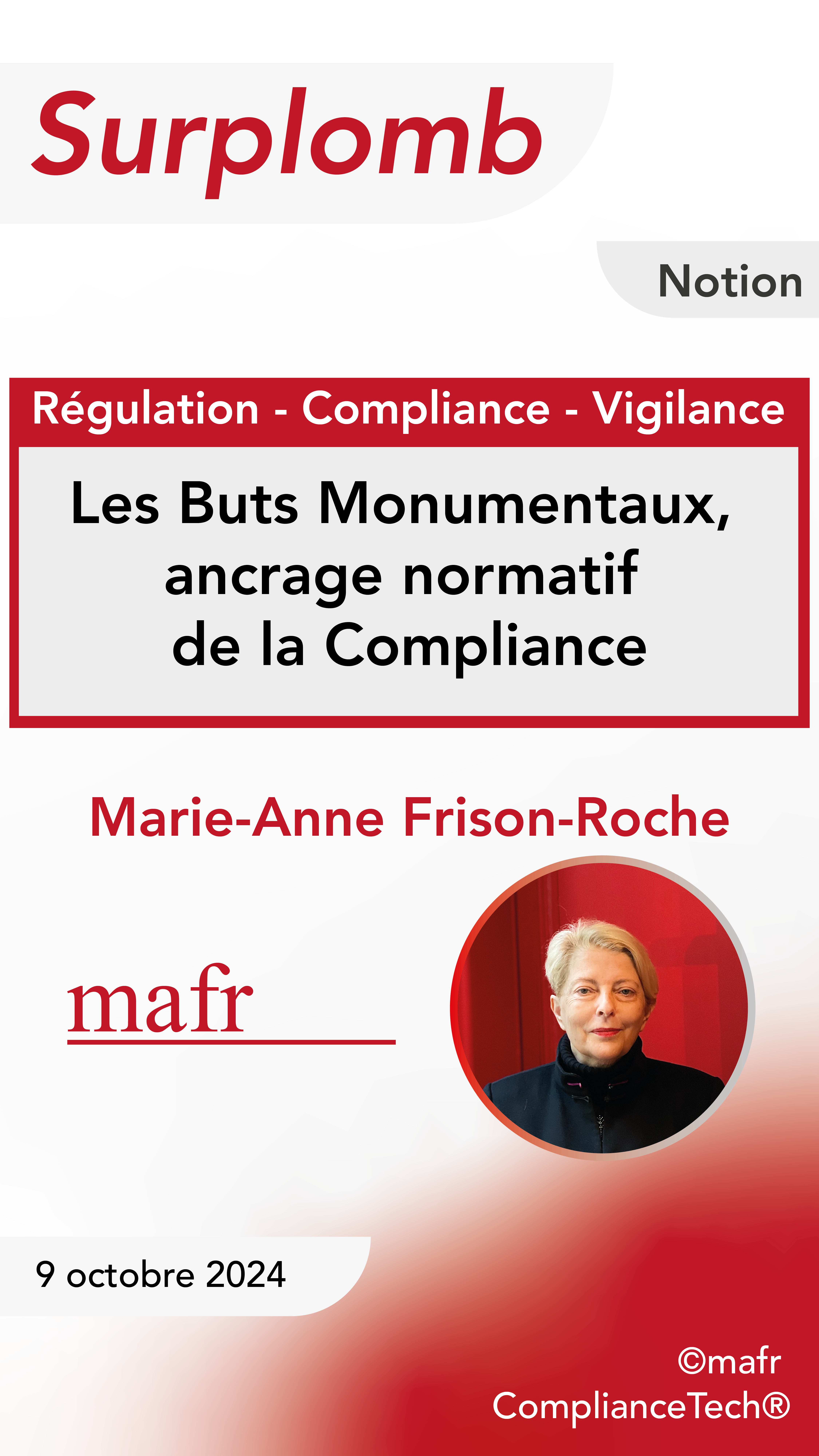Thesaurus : Doctrine
Référence complète : Boy, , "Réflexion sur le "droit de la régulation". A propos du texte de Marie-Anne Frison-Roche", D., chron., 2001, p.3031 et s.
____
Thesaurus : Doctrine
► Référence complète : A. Lyon-Caen, "Querelle de mots", RDT, 2023, p. 665
____
🦉Cet article est accessible en texte intégral pour les personnes inscrites aux enseignements de la Professeure Marie-Anne Frison-Roche
________
Compliance and Regulation Law bilingual Dictionnary

The goal for which a mechanism, a solution an institution or a rule is adopted, instituted or elaborated, is in principle external to them. Knowledge of this goal is a tool to better understand them and is only that.
On the contrary, in Regulation Law, the goal is the heart itself. By definition, Regulation Law is a set of instruments that articulate to take their meaning in relation to a goal. Moreover, these instruments are legitimate to represent a constraint only because they realize a goal which is itself legitimate. The interpretation of Regulation Law is based on the aims pursued: the reasoning is teleological.
This teleological nature explains that efficiency is no longer merely a concern - as for ordinary legal mechanisms, but rather a principle of Regulation Law. It explains the welcome, especially through the European Union Law of the theory of the useful effect. This link between rules, which are only means, and aims, refers to the principle of proportionality, which requires that constraints and exceptions be applied only when they are necessary, proportionality being the form off the classic principle of necessity.
Because the aim is the center, it must be expressed by the author of the Regulation standards, and this is all the more so if they are of a political nature, being not limited to mitigating technical failures of markets. This goal can be varied: the management of systemic risks, but also the consideration of the fundamental rights of people, the preservation of the environment, public health, civilization, education, etc. The silence of the legislature, which limits itself to the making of rules whereas these are merely instruments, without explicating the goal whereas the latter is a political decision, is a fault in the legislative art.
Moreover, in order that the person who applies the Regulation norm, in particular the Regulator and the Judge, has no excessive margin for interpretation and does not substitute for political power, the author of the Regulation norm needs to aim specifically for one goal : in this way, the one who applies the norm will be constrained. Or, if the author targets several purposes, then he must articulate them in relation to each other, by hierarchizing them for example. If he fails to do so, the institution which applies the regulatory standards will itself have to choose the purpose and exercise a power which he does not possess.
This express designation of purpose has been made for the European Banking Union, this Regulation and Supervision construction, whose primary aim is to prevent systemic risks and resolve crises. Similarly, the purpose of the Regulation of essentiel infrastructures is to provide third parties access to the network. Similarly, in the case of a transitional regulation introduced following liberalization, the aim is to establish competition, the principle of which has been declared by the liberalization law. When this is not clearly stated, there is a lapse in the legislative art.
Teachings : Banking and Financial Regulatory Law, 2016

Mais c'est d'une façon plus systématique encore qu'il faut sans cesse appliquer, par réflexe, une définition, une qualification. Par exemple : qu'est-ce qu'une banque ? qu'est-ce qu'une entreprise ? qu'est-ce que l'intérêt social ? qu'est-ce qu'un conseil ? qu'est-ce qu'une sanction ? etc.
En prenant tous ces exemples, l'on mesure qu'en matière de régulation bancaire et financière, le droit - comme partout ailleurs - ne saurait se réduire à une réglementation : c'est un art pratique dans lequel l'imagination est libre cours.
Accéder au plan de la leçon sur La primauté des définitions et des qualifications dans le droit de la régulation bancaire et financière.
Lire l'explicitation du thème de la leçon sur La primauté des définitions et des qualifications dans le droit de la régulation bancaire et financière.
Accéder aux slides de la leçon La primauté des définitions dans le droit de la régulation bancaire et financière
Consulter le Glossaire du Droit de la Régulation.
Consulter ci-dessous la bibliographie sommaire et approfondie.
Thesaurus : Doctrine
Thesaurus : Doctrine
► Référence complète : Th. Piketty et M.J. Sandel, Ce que l'égalité veut dire, Le Seuil, 2025, 141 p.
____
Il s'agit de la retranscription d'une discussion à l
► lire le résumé qui en a été fait par NonFiction
________
March 12, 2026
Conferences

🌐Follow Marie-Anne Frison-Roche on LinkedIn
🌐Subscribe to the Newsletter MAFR Regulation, Compliance, Law
🌐Subscribe to the video newsletter MAFR Overhang
🌐Subscribe to the Newsletter MaFR Law & Art
____
► Full reference : M.-A. Frison-Roche, "Obligation de compliance et gouvernance bancaire (Compliance obligations and banking governance)", in Chair in Business Ethics: Compliance, ESG and Sustainability Reporting & National Association of Bank Lawyers (ANJB), Compliance et vigilance bancaire : la participation des acteurs du secteur bancaire et financier à la LCB/FT (Compliance and Banking Vigilance: the Participation of Banking and Financial Sector Players in AML/CFT) , Faculty of Law, Catholic University of Lille, Lille, 12 March 2026.
____
🧮view the full programme for the event (in French)
____
📶view the slides (in French)
____
► English presentation of this introductory lecture of the symposium : Based on a specific method, three perspectives will be taken.
In method, to shed light on the round tables making up the day's meetings without addressing the subject in their place or pretending to answer in advance the questions they will raise, or seeking to conclude in advance without having listened to anything, which is sometimes the flaw of introductions, which are so often a kind of disguised closing statement, with just a few question marks to give the impression of change, I have adopted the old, old method of the "triple funnel" introduction.
This involves starting from a point other than the subject of the conference itself, Compliance and banking vigilance: the participation of banking and financial sector players in AML/CFT, in order to approach the subject from an external perspective and in a preliminary manner, nbsp;then moving on to a second external point, and doing so a third time, so that after this three-part presentation, the subject has been explored in sufficient depth to allow the following speakers to focus on the specific topic at hand.
This is all the easier given that the chosen theme itself focuses on three points: a specific ambition (the "fight against money laundering and terrorist financing"), a specific sector (the "banking sector") and a specific activity carried out by individuals; three specific terms: one ambition (the "fighting agains AML/CFT""activity"). - one sectors (the "banking sector") and one active department (the "participation of stakeholders").
____
My first starting point is to define what Compliance Law is in order to link Compliance Law to the subject it covers: the banking sector. Because if it were simply a matter of "being conform with applicable regulations", it is difficult to understand why the banking sector is so concerned, so constrained, so exposed to "compliance", which is simply the British way of saying "conformity". There must be more to it than simply obeying every rule and standards for preventing breaches for it, to be obliged to be so structuring and for the banking sector to be at the forefront.
It therefore appears that Compliance Law is not simply mechanical obedience to a body of regulations, but rather the contribution made by systemic operators to the realisation of political ambitions that are essential for the future (the "Monumental Goals", both negative and positive). It is in this capacity that the banking sector, because it is composed of "crucial operators", is the natural subject of Compliance Law. Its power should not be criticised; it is indispensable. In an emerging branch of law that is systemic, that is Ex Ante, that is above all a Law of action whose object is the future. Techniques of conformity is only one tool.
⛏️Go further :
🕴🏻M.-A. Frison-Roche, 📝Compliance Law, 2016
🕴🏻M.-A. Frison-Roche, 📝 Monumental goals, the beating heart of compliance law, in 🕴🏻M.-A. Frison-Roche, 📕The monumental goals of compliance, 2022
🕴🏻M.-A. Frison-Roche, 📝The Birth of a New Branch of Law: Compliance Law, 2024
🕴🏻M.-A. Frison-Roche, 📝Compliance and conformity: distinguishing between them in order to articulate them, 2024
____
My second starting point is to start with the "Monumental Goals", this normative foundation of Compliance Law, and link it to this present specific case, privileged ambition of combating money laundering and terrorist financing. Certain things are surprising. Indeed, if we refuse at the introductory stage to delve into the technicalities of the texts and the litigation surrounding them, we may wonder why these two subjects (money laundering and terrorist financing) are linked in this way. We can see the correlation between banking activitird and money laundering. Notaries, auctioneers, and, in short, anyone who handles money are also involved in the fight against it. Moreover, if we see the ratio legis, the idea remains that the one who is merely the conduit (to use the familiar basis distinction in the regulatory rule of essential network infrastructure) could also be the one who organises the content: the image remains of the money laundering banker. Even if the ex ante compliance diligence whitewashes in advance, this suspicion that remains of an ex post sanction. We pay dearly for this representation, which permeates the repressive, even Criminal, Law of banking supervision, particularly in matters of secrecy, transparency, information and risk-taking.
But why extend it to terrorist financing? Because the suspicion of terrorist bankers no longer exists. The case becomes clear-cut again. It is a matter of internalising within banks the sovereign responsibility to intervene before it is too late, before people are killed. Financing is the weak and visible point of systemic evil. This is understandable. It has moved from ex post (financial processing after the crime) to ex ante (financial processing before the crime). It is of a different nature.
But if this is of a different nature, there is no reason to stop this Ex Ante surveillance, because money movements provide so much information about collective and individual projects. For example, in the digital space. We must be careful about this, in light of the principle of freedom, of which the principle of non-interference is only one aspect.
⛏️Go further :
🕴🏻M.-A. Frison-Roche, 📝The Ex Ante - Ex Post Couple, Justification of a Specific Regulatory Law, in 🕴🏻M. -A. Frison-Roche, 📕Les engagements dans les systèmes de régulation, 2006
🕴🏻M.-A. Frison-Roche, 📝Ex Ante Responsability, a pillar of Compliance Law, 2022
🕴🏻M.-A. Frison-Roche, 📝Compliance, Vigilance and Civil Liability: Understanding and Keeping a Level Head, in 🕴🏻M.-A. Frison-Roche, 📕The obligation of compliance, 2025
____
My third starting point is "Governance", a rather mysterious term, as it relates more to the political art of mobilising human beings than to Law. Why is it necessary for "actors" to participate, when legal norms are binding and, in most cases, take the form of Criminal Law? The combination of the most violent norms, the application of financial penalties, and even deprivation of liberty, being often claimed as a victory for financial and banking regulatory and supervisatory bodies , even as procedural principles are being rolled back, could be a source of incomprehension.
Moreover, in a legal system that would be challenged by this "Governance", it is up to the State to dictate and the banks to obey. But if banks take charge of everything, it becomes difficult to maintain this system, and it is undoubtedly no longer tenable if the Monumental Goal expands to dimensions that exceed those of the State but correspond to those of the banks. The risk then is to move from one governing body to another, which is a growing social and political risk.
In practical terms, banking operators can achieve this reversal in two ways. Firstly, by effectively involving the human beings who make up their organisations, both internally and externally, their partners and stakeholders. This can be called "Governance" in an alliance based on explicitcommon goals, with contributions that are not taken at face value but are provided by "compliance structures", "credible behaviour" and "plausible trajectories".
In this respect, mutual banks are in a better position than others. Training mechanisms, which are central to Compliance Law, play an essential role here. Secondly, alliances with public authorities and regional roots, with concrete assessments, are decisive. The contract then becomes not only the mandatory means by which the regulated bank fulfils its regulatory obligation, but also the most traditional legal tool by which it exercises its freedom to contribute, in its own way, to the achievement of Monumental Goals for the future of the social group, which is currently under threat.
We are far beyond "conformity": this is called Compliance Law.
⛏️Find out more :
🕴🏻M.-A. Frison-Roche, 📝A substantive Compliance Law, based on the European humanist tradition,in 🕴🏻M. -A. Frison-Roche, 📕Towards a Europe of Compliance, 2019
🕴🏻M.-A. Frison-Roche, 📝Training: content and context of Compliance Law, in 🕴🏻M. -A. Frison-Roche, 📕Compliance tools, 2020
🕴🏻M.-A. Frison-Roche, 📝Compliance Contract, compliance clauses, 2022
🕴🏻M.-A. Frison-Roche, ⚙️Compliance and Contracts, 2026
🕴🏻M.-A. Frison-Roche, 🏛️Assignment given by the Frenc, Minister of Justice, Compliance Law, Work in progress, 2025 - 2026.
________
Jan. 8, 2026
Interviews

🌐suivre Marie-Anne Frison-Roche sur LinkedIn
🌐s'abonner à la Newsletter MAFR Regulation, Compliance, Law
🌐s'abonner à la Newsletter en vidéo MAFR Surplomb
🌐s'abonner à la Newsletter MaFR Droit & Art
____
► Référence complète : M.-A. Frison-Roche, «"Géomètres-experts : une profession qui s’engage dans la compliance"», interview pour Solution Notaire Hebdo, Lefebvre Dalloz, 8 janvier 2026
Interrogée par Juliette Courquin, journaliste à Solution Notaire Hebdo
___
► lire l'entretien : 💬 Lire l'interview au cours duquel les réponses ont été apportées aux questions reproduites ci-dessous⤵
____
Q. Pourriez-vous définir le droit de la compliance ?
Q. La compliance se prête-t-il à l'Ordre des géomètres-experts et à la profession elle-même ?
Q. L'OGE et la profession se sont engagés dans la compliance en définissant leur raison d'être, quelles en sont les conséquences juridiques ?
Q. Un dernier mot sur l'Ordre des géomètres-experts et la profession avec qui vous avez travaillé sur la compliance ?
_________
⛏️Aller plus loin sur la question :
🕴🏻M.-A. Frison-Roche, 🎤Concevoir une raison d'être et l'expliciter, 2025
🕴🏻M.-A. Frison-Roche, 📝Les buts monumentaux de la compliance, coeur battant du droit de la compliance, 2023
________
Oct. 2, 2025
Hearings by a Committee or Public organisation

🌐suivre Marie-Anne Frison-Roche sur LinkedIn
🌐s'abonner à la Newsletter MAFR Regulation, Compliance, Law
🌐s'abonner à la Newsletter en vidéo MAFR Surplomb
🌐s'abonner à la Newsletter MaFR Droit & Art
____
► Référence complète : M.-A. Frison-Roche, Audition par le collège thématique "RSE" de l'Observatoire des litiges judiciaires de la Cour de cassation, " Points de contact entre le Droit de la Compliance et la RSE", Cour de cassation, 2 octobre 2025.
____
► Résumé de la présentation : La présentation dure une demie-heure. Elle est construite en deux temps, tout d'abord une présentation générale sur les "points de contact entre Droit de la compliance et RSE", en ce qu'ils dépendent de la conception que l'on a en pratique du Droit de la compliance, puis, dans la mesure où cette perspective intéresse plus particulièrement le collège thématique, un approfondissement sur les conséquences processuelles qu'il convient d'en tirer.
PREALABLE. DISTINGUER NETTEMENT LE DROIT DE LA COMPLIANCE DE LA RSE, SEULE VOIE POUR LES ARTICULER
1. ne pas confondre la morale, source d'inspiration du Droit, et le Droit.
Le Droit a des sources multiples, économiques, sociales, morales et religieuses. Les impératifs moraux inspirent le Droit, guident ceux qui adoptent des règles juridiques, guident les comportements. Mais ce sont deux ordres différents. Kelsen a construit sa "théorie pure" du Droit pour protéger le système juridique afin qu'il ne soit qu'inspiré par des valeurs qui sont dans une Norme fondamentale hors du système juridique. Ce que l'on appelle RSE est une norme qui inspire de nombreux blocs de compliance, par exemple Sapin 2, la loi Vigilance, la CSRD, la CS3D, etc. mais, de la même façon que la responsabilité juridique ne transforme pas le Deutéronome en Droit, ces textes ne transforment pas la RSE en Droit. Le Droit demeure autonome, n'est pas l'agent d'efficacité de l'éthique, qui trouverait enfin la puissance du Droit à son service.
De la même façon que le Droit économique n'est pas la façon dont des "lois économiques" trouvent une plus grande efficacité. Cela serait une erreur de pénétration entre deux ordres, et une vassalisation pour le Droit qui deviendrait l'agent d'effectivité d'une norme qui lui est hétéronome. Les économistes ne veulent pourtant au bénéfice de ce qui serait la loi économique. Carl Schmitt le voulait au bénéfice de ce qui serait la loi politique. Il est impératif dans un Etat de Droit que le Droit garde son autonomie par rapport à l'économie, à la politique et à l'éthique (ESG, RSE).
2. la loi peut, pour des motifs moraux, imposer à l'entreprise des obligations juridiques légales
Le Droit l'a toujours fait.
3. la responsabilité morale et la responsabilité juridique sont distinctes : la première n'entraîne pas ipso facto la seconde
4 l'entreprise peut par sa volonté s'imposer des obligations qui expriment des choix moraux, dès l'instant qu'ils ne contredisent pas la loi : elle juridicise sa responsabilité morale, les deux obligations se superposant
🔴mafr, 📝"Obligation sur obligation vaut", 2025
I. CE QU'EST EN PRATIQUE LE DROIT DE LA COMPLIANCE, BATI SUR L'OBLIGATION DE COMPLIANCE A LAQUELLE L'ENTREPRISE EST ASSUJETTIE
1. définition faible et définition forte de la compliance : ne pas réduire le Droit à une peau de chagrin, aider par sa "juridictionnalisation" à ce que la branche naissante du Droit de la compliance grandisse dans sa conception européenne
🔴 mafr (dir.),📕 Pour une Europe de la Compliance, 2019
🔴 mafr (dir.),📕 Les buts monumentaux de la compliance, 2022
🔴 mafr (dir.),📕 L'obligation de compliance , 2025
2. le rôle central du juge dans le droit européen de la compliance, en construction
🔴 mafr (dir.),📕 La juridictionnalisation de la compliance , 2024
3. l'obligation de vigilance, pointe avancée de l'obligation de compliance,
🔴mafr, 📝La vigilance, pointe avancée et part totale de l'obligation de compliance, 2025
II. POINTS DE CONTACT ENTRE L'OBLIGATION DE COMPLIANCE DES ENTREPRISES CRUCIALES ET LA RESPONSABILITE SOCIETALE DES ENTREPRISES
1. définition de l'obligation de compliance à laquelle l'entreprise cruciale est assujettie
2. "Obligation sur obligation vaut"
🔴mafr, 📝"Obligation sur obligation vaut", 2025
3. cumul possible des deux natures, engagement de droit, engagement de fait : régime juridique (ex. La Haye, 12 nov. 2024, Shell)
🔴mafr, 📝A quoi engagent les engagements, 2025
4. ll n'existe pas d'obligation juridique générale de veiller sur autrui ; il existe des obligations spéciales, une obligation spéciale sur l'entreprise maîtresse de sa chaine de valeur et, par exemple un souci éthique que l'entreprise, par sa volonté, peut juridiciser
🔴mafr, 📝Compliance, vigilance et responsabilité civile : mettre en ordre et raison garder, 2025
III. PERSPECTIVE PROCESSUELLES DES POINTS DE CONTACT ENTRE DROIT DE LA COMPLIANCE ET RSE
1. Nature transitivement systémique du contentieux de la compliance
🔴mafr, 📝Les causes systémiques portées devant le juge, 2021
🔴mafr, 📝Droit de la compliance et contentieux systémique, 2025
🔴mafr (dir.), 📕 Contentieux systémique émergent, 2025
2. Double primauté : trouver des solutions ; avoir souci du futur
🔴🧮Dans l’espace de justice, les pratiques juridictionnelles au service du futur, 2024
🔴Th. Goujon-Bethan, 📝Les enjeux présents et à venir de l'articulation des principes de procédure civile et commerciale avec la logique de compliance, 2025
3. Régression de la méthode punitive, efficacité du principe contradictoire et de l'accusatoire comme mode d'obtention des informations, engagements et "programmes"
🔴F. Ancel, 📝Devoir de vigilance et litiges commerciaux : une compétence à partager ?, 2025
🔴M. Chapuis, 📝Le juge de l'amiable et la compliance, 2025
🔴Th. Goujon-Bethan, 📝Les enjeux présents et à venir de l'articulation des principes de procédure civile et commerciale avec la logique de compliance, 2025
4. Préserver les droits de la défense et la sagesse probatoire dont les pavés sont attaqués dans le paradis de la RSE
🔴mafr, 📝Le juge, l'obligation de compliance et l'entreprise. Le système probatoire de la Compliance, 2023
🔴 mafr et M. Boissavy (dir.),📕 Compliance et droits de la défense. Enquêtes internes, CJIP, CRPC, 2024
🔴J.-Ch. Roda, 📝La preuve de la bonne exécution de la vigilance au regard du système probatoire de compliance,2025
____
Oct. 2, 2025
Publications

🌐follow Marie-Anne Frison-Roche on LinkedIn
🌐subscribe to the Newsletter MAFR Regulation, Compliance, Law
🌐subscribe to the Video Newsletter MAFR Surplomb
____
► Full Reference: M.-A. Frison-Roche, "La Vigilance, pointe avancée et part totale de l’Obligation de Compliance" (Vigilance, the cutting edge and a full part of the Compliance Obligation), in M.-A. Frison-Roche (ed.), L'Obligation de Compliance, Journal of Regulation & Compliance (JoRC) and Dalloz, coll. "Régulations & Compliance" 2025, pp. 511-536.
____
📝read the article (in French)
____
____
📕read a general presentation of the book, L'Obligation de Compliance, in which this article is published
____
► English summary of this contribution : The "duty of vigilance" unleashes all the more radical and passionate positions, sometimes among Law professors, because it has not been precisely defined. One word is used for another, either inadvertently or deliberately, deliberately if it can attract this or that element from one legal corpus and import it into another. The very exercise of definition is therefore required in practice. There are specific obligations of vigilance that come under such and such a body of regulations and are imposed on such and such a category of operators to fulfill such and such a function. These are precise circles which are not confused and must not be confused. This is superimposed on what the French 2017 law so-called "Vigilance law", which is much more encompassing since it applies to all large companies in the operation of the value chains they have set up. The European 2024 directive is in the same way. But there is no general duty or obligation of Vigilance. Such a claim would be based on confusing or shifting each of these 3 levels, which must be avoided because no positive law does support this (I).
If the duty of vigilance is attracting so much attention, whether or not the European CS3D is fully effective, it is because Vigilance is the "cutting edge" of Compliance Obligation (II). Vigilance requires companies, by consideration of their power and without reproaching them for it or demanding that it be reduced, to detect risks of damage to the environment and climate, but also to human rights, because they are in a position to do so in order to prevent them from turning into disasters. In this respect, the Vigilance duty makes clearer the exact legal nature of the Compliance Obligation.
Moreover, Vigilance appears as the Total Part of the Compliance Obligation (III). Indeed, although it is restricted to one area, the value chain, and to two types of risk, deterioration of the environment and deterioration of human rights, it expresses the totality of the Compliance Obligation by means of tools that the 2017 French "Vigilance law" had itself duplicated from the 2016 so-called "Sapin 2 law": to preserve systems today, but above all tomorrow, in order they do not collapse (Negative Monumental Goals), or even consolidate them (Positive Monumental Goals), so that the human beings who are willingly or unwillingly involved in them are not crushed by them but benefit from them. This is why large companies are subject to the Obligation of Compliance and Vigilance, particularly in the humanist conception that Europe is developing.
The result is a new type of Litigation, of a systemic nature, for which the Courts have spontaneously become specialised, and for which the procedures will have to be adapted and the office of the Judge shall have to evolve.
________
Sept. 15, 2025
Conferences

🌐follow Marie-Anne Frison-Roche on LinkedIn
🌐subscribe to the Newsletter MAFR Regulation, Compliance, Law
🌐subscribe to the Video Newsletter MAFR Surplomb
🌐subscribe to the Newsletter MaFR Droit & Art
____
► Full Reference: M.-A. Frison-Roche, "Compliance Law and Systemic Litigation", 15 September 2025, Madrid.
____
This speech is the opening speech of the event.
🧮 See the general program of the event
____
📅See the slides (not used), basis for this speechs
____
► Summary of the conference: This manifestation, made fo many interventions, is about the role and the evolution of the in-house lawyers in the Europe on the move. I opened the event by focusing on the importance of the Compliance which drives the companies now, in the future and for the future. It is quite difficile because currently Compliance Law is quite misunderstund by almost every. Therefore the first part of my intervention has been the explanation of what is the very new branch of Law, built of political Monumental Goals (Compliance Law is not just the obligation to be conform with, just to obey), the specificity of European Compliance Monumental Goals (not only the sustainability of systems, but also the concern for present and future human beins implied in them).
This systemic new branch of Law, humanist branch of Law in Europe put the Judge at its center.
Par translation, this is creating a new sort of Litigation : the Compliance Systemic Litigation. Its object is the future (as Compliance Law itselft).
Contrary to the "conformity", which might be left to algorithms, Compliance Law, inseparable to Systemic Litigation, are giving new role for Judges, for external lawyers and for internal lawyers.
________
Sept. 10, 2025
Publications

🌐follow Marie-Anne Frison-Roche on LinkedIn
🌐subscribe to the Newsletter MAFR Regulation, Compliance, Law
🌐subscribe to the Video Newsletter MAFR Surplomb
🌐subscribe to the Newsletter MaFR Droit & Art
____
► Full Reference: M.-A. Frison-Roche, "Régulation" (Regulatory Law), in J.-Fr. Kerléo et E. Lemaire (dir.), Dictionnaire de l'éthique publique, LexisNexis, 2025, pp.
____
📗read the general presentation of the Dictionary.
____
📝read the article (in French)
_____
► English Summary of this article defining Regulation: To define Regulation (Regulatory Law), the article begins with its origins, which were a source of misunderstanding, since the term Regulation might refer to simple regulations, thus masking the real branch of Law which is the Law of Regulation. But this confusion with simple and formal regulations has diminished Regulatory Law its importance, its novelty and its originality, and, by placing it within Public Law, equated Regulation on the one hand with the transition from public monopolies to a competitive organisation, and on the other hand privileged the legal study of what fell within the remit of the Administrative Courts, i.e. telecommunications, transport and energy, leaving out the Regulatory Law of banking and financial sector . As a result, the unity and strength of Regulatory Law is still difficult to perceive and manage today, while its relationship with competition and Europe remains difficult.
Regulatory Law is all the more difficult to define because it is still common to oppose, as was the case in the 1980s, "Economic Regulatory Law", which would aim to set economic efficiency objectives within the State, and "Public Liberties Regulatory Law", which would be alternatives to each other, preventing the audiovisual, media and digital sectors in particular from being legally perceived as an industry. We are still paying for this initial conception. All the more so since Regulatory Law is the second pillar on which Europe is built, along with Competition, with which it is linked. It can be identified by the existence of a regulated 'sector', most often through the establishment of a regulatory authority, generally in the form of an Independent Administrative Body. But it is defined by the prevalence of the technical and political goals pursued, which are not spontaneously achieved and which aim to favour the human beings involved in economic organisations.
While the function of Competition Authorities is to maintain the dynamism of competitive markets and to punish behaviour that hinders them without creating that dynamism, Regulatory Law, through its own rules, principles, institutions, procedures and decisions, will create non-spontaneous équilibra and maintain them over time. To do this, it will inject non-spontaneous procedures, such as transparency, or generate obligations and powers because these are necessary for this balance to be achieved. This can take the form of exclusive rights, which can go as far as the creation of monopolies, particularly on transport infrastructures, or the form of pricing and tarification, which can go as far as free access. Access rights are essential, whether technical or political (access to networks, access to healthcare).
The political dimension of Regulatory Law is very much in evidence, as Europe is developing its own form of Regulation compared with the USA or China, demonstrating the link between Regulation and Sovereignty, the criterion? of the technical sector becoming less significant. This is illustrated by the clash over algorithmic systems (AI). In this way, regulation is not a technical reaction to a "market failure", but the manifestation of a zone's political power both internally and externally. The DSA (2022) is an example of this, imposing this same logic extraterritoriality in the digital space through the Digital Services Act (DSA) adopted in 2022.
____
📝read the presentation of the other article written by Marie-Anne Frison-Roche for this Dictionary: "Compliance"
________
Sept. 10, 2025
Publications

🌐follow Marie-Anne Frison-Roche on LinkedIn
🌐subscribe to the Newsletter MAFR Regulation, Compliance, Law
🌐subscribe to the Video Newsletter MAFR Surplomb
🌐subscribe to the Newsletter MaFR Droit & Art
____
► Full Reference:: M.-A. Frison-Roche, "Compliance", in J.-Fr. Kerléo & E. Lemaire (dir.), Dictionnaire de l'éthique publique, LexisNexis, 2025, pp.
____
📗 read the general presentation of the Dictionary.
____
📝read the article (in French).
_____
► English Summary of the article defining what is Compliance: The article explains Compliance in 7 points.
Firstly, it states that Compliance oscillates between a weak and a strong definition. It can be defined weakly as the demonstration of obedience to all applicable regulations, or it can be defined strongly as active participation in the achievement of 'monumental' ambitions for the future of the social group. Positive legal rules and case law are increasingly revealing the relevance of the strong definition, with the weak definition referring only to conformity to the Law.
Secondly, this understanding of the new branch of Law known as Compliance Law will enable us to master the regulations specifically relating to compliance (RGPD, French laws such as Sapin 2 Act and Vigilance Act, AML/FT, European AI Act, etc.), which are both more specific and more restrictive than the general obligation to comply with the applicable legal rules.
Thirdly, everyone can see the move from "extraterritoriality" to another thing which is the indifference to territoryd: Compliance is the right instrument for the digital space and for chains of activities.
Fourthly, this is due to the very nature of Compliance, which consists in internalising in companies in a position to be active the “Monumental Negative Goal” of preventing the collapse of systems (energy, climate, digital, banking, financial, algorithmic, etc.).
Fifthly, this internalisation is carried out by States and public authorities in entities in a position to act, i.e. in concrete terms in companies in a position to be active to reach the “Monumental Goals” by contributing to the improvement of systems so that these systems benefit in the present and the future the people who are de jure and de facto involved in them.
Sixthly, these goals become positive when it comes to educating people about probity and effective equality between human beings, notably through training policies. In this respect, Vigilance is the “cutting edge” of Compliance.
Seventhly, an “ex ante responsibility” of Crucial Operators subject to Compliance is emerging, and is articulated by Systemic Litigation which aims to balance and maintain systems, carried by States and these crucial companies.
____
📝read the preentation of the other article written by Marie-Anne Frison-Roche for this Dictionary: "Régulation"
________
Sept. 4, 2025
Thesaurus : Doctrine

► Référence complète : G. J. Martin, "Clauses et contrats, modalités de l’obligation de vigilance", in M.-A. Frison-Roche (dir.), L'obligation de Compliance, Journal of Regulation & Compliance (JoRC) et Éditions Lefebvre - Dalloz, coll. "Régulations & Compliance", 2025, sous presse
____
📕lire une présentation générale de l'ouvrage, L'obligation de Compliance, dans lequel cet article est publié
____
► Résumé de l'article (fait par le Journal of Regulation & Compliance - JoRC) : L'auteur se consacre à ce qui est souvent désigné comme les "clauses RSE" en ce qu'elles constituent une façon pour les entreprises de mettre en oeuvre leur Obligation de Compliance. Dans une pratique encore "balbutiante", les entreprises contractualisent ainsi leur aspiration éthique et leur obligation légale, définissant au passage plus précisément ce qu'est pour elle l'obligation de compliance et/ou de vigilance, notamment par des référentiels internes ou/et externes, en y associant des mécanismes d'évaluation, d'audit et de sanctions spécifiques, comme la résiliation.
En outre, le contrat organise l'articulation avec des clauses commerciales ayant un autre objet, Cela est d'autant plus requis que l'objet de ces clauses est aussi de "faire ruisseler" l'obligation légale au-delà du premier cercle contractuel. Le risque de déséquilibre devra être évité. Les clauses devront être précises et limitées, notamment au regard de l'espace et du temps.
Dans un second temps, l'auteur examine l'articulation du Droit commun des contrats et du Droit spécial de la Vigilance. En effet, après avoir posé que le contrat soit le moyen, et même le seul moyen, de transformer la soft Law en hard Law dans les relations entre les parties contractantes, l'auteur estime que si une telle clause figure dans un contrat commercial figurant dans une situation visée par la lo de 2017 (chaine de valeur, rapport société-mère et filiale) il y a cumul de qualités. Il en naît donc des conflits de compétence avec le Tribunal judiciaire de Paris et l'on peut regretter l'abandon de la solution retenue par la Cour de cassation ouvrant une option de compétence.
Une autre articulation difficile devra être faite en cas de nullité de la clause RSE, annulation que le juge de droit commun peut prononcer, suivant qu'elle sera estimée par le juge déterminante ou non d'autres clauses, voire du contrat. En cas d'inexécution de la clause, la rupture des relations commerciales peut être prononcée, mais l'on peut penser qu'un préavis doit être respecté.
Enfin si l'objet même du contrat est l'exécution de l'obligation de vigilance, il faut que cela n'équivaille pas à une délégation qui anéantirait le principe légal d'une responsabilité personnelle.
_________
🦉Cet article est accessible en texte intégral pour les personnes inscrites aux enseignements de la Professeure Marie-Anne Frison-Roche
________
Sept. 4, 2025
Thesaurus : Doctrine

► Full Reference: M. Séjean, "La définition de l’obligation de compliance confrontée au droit de la cybersécurité (The definition of the Compliance Obligation in Cybersecurity Law)", in M.-A. Frison-Roche (ed.), L'obligation de Compliance, Journal of Regulation & Compliance (JoRC) and Dalloz, coll. "Régulations & Compliance", 2025, forthcoming.
____
📕read the general presentation of the book, L'obligation de Compliance, in which this article is published.
____
► English Summary of this contribution (done by the Journal of Regulation & Compliance - JoRC) : The contribution compares the general definition given by Marie-Anne Frison-Roche with the specific nature of the world of cybersecurity, its legal organisation and the principles that govern it.
Taking up all the elements of this general definition, according to which the Compliance Obligation consists in "building a compliance structure producing credible effects in the perspective of the Monumental Goals targeted by the Legislator", the author shows that beyond the specificities of cybersecurity rules, this corresponds in practice and in each of the elements of this definition, confronted with the various elements that constitute what is required in terms of cybersecurity, to what is technically required of the entities and persons concerned in terms of cybersecurity, which is actually thought out in these terms.
________

May 31, 2025
Publications

🌐follow Marie-Anne Frison-Roche on LinkedIn
🌐subscribe to the Newsletter MAFR Regulation, Compliance, Law
🌐subscribe to the Video Newsletter MAFR Surplomb
🌐subscribe to the Newsletter MaFR Droit & Art
____
 ► Full Reference : M.-A. Frison-Roche, To master the regulatory mass of Compliance, think of it as a jigsaw puzzle, Working Paper , May 2025
► Full Reference : M.-A. Frison-Roche, To master the regulatory mass of Compliance, think of it as a jigsaw puzzle, Working Paper , May 2025
____
📝 This Working Paper underpins the Newsletter MAFR Law -Compliance - Regulation of 2 June 2025 :
____
► Summary of this Working Paper: People are rightly complaining that Europe's regulatory and compliance regulations are too numerous, too complicated and too changeable. As a result, they are said to be unmanageable.
Three solutions are proposed: specialise lawyers, regulatory corpus by regulatory corpus; deregulate; entrust everything to algorithms.
These are inadequate solutions, because regulations cannot be understood unless they are put into perspective with the rest of the legal rules .; we have entered a new world, and these new regulations reflect the need for a new Law (unless we want to destroy the Law itself, which is what some people are dreaming of doing); algorithms reproduce past solutions and do not produce the new legal conception required.
For an appropriate solution, we need to move away from a word-by-word understanding of the regulatory and compliance regulations and understand them as a whole, not only in relation to the purpose that gives them meaning, but also in relation to each other. In the positive sense of the term, they form a European 'jigsaw puzzle'. We need to look at the overall picture in which each regulation fits and makes sense. It finds its simplicity in relation to its purpose.
It is always a question of working towards the sustainability of systems by asking companies to contribute so that the systems do not crush human beings but benefit them. Thus, in practice, the Monumental Goals of Compliance Law give clarity to the body of regulations which, when seen as a whole, are manageable and practical. Judges interpret them in this way.
____
🔓read the Working Paper below⤵️

Updated: Feb. 25, 2025 (Initial publication: Nov. 8, 2023)
Publications

🌐follow Marie-Anne Frison-Roche on LinkedIn
🌐subscribe to the Newsletter MAFR Regulation, Compliance, Law
🌐subscribe to the Video Newsletter MAFR Surplomb / Overhang
🌐subscribe to the Newsletter MaFR Droit & Art
____
 ► Full Reference: M.-A. Frison-Roche, Vigilance, the cutting edge and a full part of the Compliance Obligation, Working Paper, November 2023, updated in February 2025
► Full Reference: M.-A. Frison-Roche, Vigilance, the cutting edge and a full part of the Compliance Obligation, Working Paper, November 2023, updated in February 2025
____
📝 This Working Paper is the basis of the article, "Vigilance, the cutting edge and a full part of the Compliance Obligation Vigilance" (Vigilance, the cutting edge and a full part of the Compliance Obligation), published in 📘Compliance Obligation
____
► Summary of this Working Paper: The "duty of vigilance" unleashes all the more radical and passionate positions, sometimes among Law professors, because it has not been precisely defined. One word is used for another, either inadvertently or deliberately, deliberately if it can attract this or that element from one legal corpus and import it into another. The very exercise of definition is therefore required in practice. There are specific obligations of vigilance that come under such and such a body of regulations and are imposed on such and such a category of operators to fulfill such and such a function. These are precise circles which are not confused and must not be confused. This is superimposed on what the French 2017 law so-called "Vigilance law", which is much more encompassing since it applies to all large companies in the operation of the value chains they have set up. The European 2024 directive is in the same way. But there is no general duty or obligation of Vigilance. Such a claim would be based on confusing or shifting each of these 3 levels, which must be avoided because no positive law does support this (I).
If the duty of vigilance is attracting so much attention, whether or not the European CS3D is fully effective, it is because Vigilance is the "cutting edge" of Compliance Obligation (II). Vigilance requires companies, by consideration of their power and without reproaching them for it or demanding that it be reduced, to detect risks of damage to the environment and climate, but also to human rights, because they are in a position to do so in order to prevent them from turning into disasters. In this respect, the Vigilance duty makes clearer the exact legal nature of the Compliance Obligation.
Moreover, Vigilance appears as the Total Part of the Compliance Obligation (III). Indeed, although it is restricted to one area, the value chain, and to two types of risk, deterioration of the environment and deterioration of human rights, it expresses the totality of the Compliance Obligation by means of tools that the 2017 French "Vigilance law" had itself duplicated from the 2016 so-called "Sapin 2 law": to preserve systems today, but above all tomorrow, in order they do not collapse (Negative Monumental Goals), or even consolidate them (Positive Monumental Goals), so that the human beings who are willingly or unwillingly involved in them are not crushed by them but benefit from them. This is why large companies are subject to the Obligation of Compliance and Vigilance, particularly in the humanist conception that Europe is developing.
The result is a new type of Litigation, of a systemic nature, for which the Courts have spontaneously become specialised, and for which the procedures will have to be adapted and the office of the Judge shall have to evolve.
_____
🔓read the developments below⤵️

Feb. 1, 2025
MAFR TV : MAFR TV - Overhang

🌐follow Marie-Anne Frison-Roche on LinkedIn
🌐subscribe to the Newsletter MAFR. Regulation, Compliance, Law
🌐subscribe to the Video Newsletter MAFR. Overhang / Surplomb
____
► Full Reference: M.-A. Frison-Roche, "Monumental Goals, normative anchoring of Compliance Law", in Series of videos Overhang / Surplomb, 1st February 2025
____
🌐watch on LinkedIn this video of the Series Surplomb/Overhang
____
____
🎬watch below this video of the Serie Surplomb/Overhang⤵️
____
Surplomb/Overhang, by mafr
the Serie of videos dedicated to Regulation, Compliance and Vigilance



Jan. 18, 2025
Publications

🌐follow Marie-Anne Frison-Roche sur LinkedIn
🌐subscribe to the Newsletter MAFR Regulation, Compliance, Law
🌐subscribe to the Video Newsletter MAFR Surplomb
____
 ► Full Reference: M.-A. Frison-Roche, Status and Role of the 'trajectory' in Regulatory and Compliance Law, Working Paper, January 2025.
► Full Reference: M.-A. Frison-Roche, Status and Role of the 'trajectory' in Regulatory and Compliance Law, Working Paper, January 2025.
____
🎤 This Working Paper was developed as a basis for the Overhang👁 video on 18 January 2024 : click HERE (in French)
____
🎬🎬🎬In the collection of the Overhangs👁 It falls into the Notions category.
►Watch the complete collection of the Overhangs👁 : click HERE
____
► Summary of this Working Paper: The notion of Trajectory is a key concept in Compliance Law. This is shown in 4 steps.
- 1. the decisive use of the trajectory in the 3 Grande-Synthe decisions of the French Conseil d'Etat,
- 2. defining the trajectory,
- 3. the application of the trajectory in various sectoral Compliances and Compliance tools,
- 4. the probationary dimension of the trajectory and the consequences for subjected entities
____
🔓read the developments below⤵️

Jan. 18, 2025
MAFR TV : MAFR TV - Overhang

🌐suivre Marie-Anne Frison-Roche sur LinkedIn
🌐s'abonner à la Newsletter MAFR. Regulation, Compliance, Law
🌐s'abonner à la Newsletter Surplomb, par MAFR
____
► Référence complète : M.-A. Frison-Roche, "Statut et rôle de la "trajectoire" dans le Droit de la Régulation et de la Compliance", in série de vidéos Surplomb, 18 janvier 2025
____
🌐visionner sur LinkedIn cette vidéo de la série Surplomb
____
____
🎬visionner ci-dessous cette vidéo de la série Surplomb⤵️
____
Surplomp, par mafr
la série de vidéos dédiée à la Régulation, la Compliance et la Vigilance



Updated: Dec. 4, 2024 (Initial publication: Feb. 6, 2024)
Publications

🌐follow Marie-Anne Frison-Roche on LinkedIn
🌐subscribe to the Newsletter MAFR Regulation, Compliance, Law
🌐subscribe to the Video Newsletter MAFR Surplomb
____
 ► Full Reference: M.-A. Frison-Roche, In Compliance Law, the legal consequences for Entreprises of their commitments and undertakings, June 2024.
► Full Reference: M.-A. Frison-Roche, In Compliance Law, the legal consequences for Entreprises of their commitments and undertakings, June 2024.
____
📝 This Working Paper is the basis for the contribution "In Compliance Law, the legal consequences for Entreprises of their commitments and undertakings", in📘Compliance Obligation.
____
► Summary of this Working Paper: The innocents might believe, taking the Law and its words literally, that "commitments" are binding on those who make them. Shouldn't they be afraid of falling into the trap of the 'false friend', which is what the Law wants to protect them from (as stated in the prolegomena)?
Indeed, the innocent persons think that those who make commitments ask what they must do and say what they will do. Yet, strangely enough, the 'commitments' that are so frequent and common in compliance behaviours are often considered by those who adopt them to have no binding value! Doubtless because they come under disciplines other than Law, such as the art of Management or Ethics. It is both very important and sometimes difficult to distinguish between these different Orders - Management, Moral Norms and Law - because they are intertwined, but because their respective standards do not have the same scope, it is important to untangle this tangle. This potentially creates a great deal of insecurity for companies (I).
The legal certainty comes back when commitments take the form of contracts (II), which is becoming more common as companies contractualise their legal Compliance Obligations, thereby changing the nature of the resulting liability, with the contract retaining the imprint of the legal order or not having the same scope if this prerequisite is not present.
But the contours and distinctions are not so uncontested. In fact, the qualification of unilateral undertaking of will is proposed to apprehend the various documents issued by the companies, with the consequences which are attached to that, in particular the transformation of the company into a 'debtor', which would change the position of the stakeholders with regard to it (III).
It remains that the undertakings expressed by companies on so many important subjects cannot be ignored: they are facts (IV). It is as such that they must be legally considered. In this case, Civil Liability will have to deal with them if the company, in implementing what it says, what it writes and in the way it behaves, commits a fault or negligence that causes damage, not only the sole existence of an undertaking.
_____
🔓read the developments below ⤵️

Oct. 9, 2024
Publications

🌐follow Marie-Anne Frison-Roche sur LinkedIn
🌐subscribe to the Newsletter MAFR Regulation, Compliance, Law
🌐subscribe to the Video Newsletter MAFR Overhang/Surplomb
____
 ► Full Reference: M.-A. Frison-Roche, Monumental Goals, normative anchoring of Compliance, Working Paper, February 2025.
► Full Reference: M.-A. Frison-Roche, Monumental Goals, normative anchoring of Compliance, Working Paper, February 2025.
____
🎬This working document has been drawn up to serve as basis to
the video Overhang👁 of the 1st February 2025: click HERE
____
🎬🎬🎬In the collection of the Overhangs👁 It falls into the Notions category.
►Watch the complete collection of the Overhangs👁 : click HERE
____
► Summary of this Working Paper: Compliance, of which conformity is only one instrument (the 2 should not be confused), must be understood through the ‘Monumental Goals’ : political ambitions pursued by the public authorities and internalised in the entities in a position to achieve them, i.e. large companies.
These Goals are Monumental in that they concern systems: ensuring that these systems do not collapse in the future = ‘Negative Monumental Goals’ (e.g. fight against corruption, against climate change); more ambitious still, they may aim to improve systems = ‘Positive Monumental Goals’ (e.g. effective equality between women and men).
Their systemic nature gives rise to Systemic Litigation.
____
🔓read the developments below⤵️

Oct. 9, 2024
MAFR TV : MAFR TV - Overhang

🌐suivre Marie-Anne Frison-Roche sur LinkedIn
🌐s'abonner à la Newsletter MAFR. Regulation, Compliance, Law
🌐s'abonner à la Newsletter Surplomb, par MAFR
____
► Référence complète : M.-A. Frison-Roche, "Les Buts Monumentaux, ancrage normatif de la Compliance", in série de vidéos Surplomb, 9 octobre 2024
____
🌐visionner sur LinkedIn cette vidéo de la série Surplomb
____
____
🎬visionner ci-dessous cette vidéo de la série Surplomb⤵️
____
Surplomp, par mafr
la série de vidéos dédiée à la Régulation, la Compliance et la Vigilance



June 14, 2024
Publications

.🌐suivre Marie-Anne Frison-Roche sur LinkedIn
🌐s'abonner à la Newsletter MAFR Regulation, Compliance, Law
____
 ► Full Reference: M.-A. Frison-Roche, Designing the Uniqueness of the Compliance Obligation without diluting it, June 2024.
► Full Reference: M.-A. Frison-Roche, Designing the Uniqueness of the Compliance Obligation without diluting it, June 2024.
____
📝This working paper was drawn up to serve as the basis for the second introductory article in the book Compliance Obligation, the first having presented all the contributions to the book.
____
► Summary of this Working Paper: Des
____
🔓lire le document de travail ci-dessous⤵️

Updated: March 15, 2024 (Initial publication: Nov. 30, 2023)
Publications

🌐follow Marie-Anne Frison-Roche on LinkedIn
🌐subscribe to the Newsletter MAFR Regulation, Compliance, Law
🌐subscribe to the Video Newsletter MAFR Surplomb
____
 ► Full Reference: M.-A. Frison-Roche, Births of a branch of Law: Compliance Law, Working Paper, November 2023.
► Full Reference: M.-A. Frison-Roche, Births of a branch of Law: Compliance Law, Working Paper, November 2023.
____
📕This Working Paper was drawn up as a basis for a contribution to the collective book given to Professor Louis Vogel, published in 2024
____
► Summary of this Working Paper: The study looks at the various movements that have given birth to Compliance Law, with particular emphasis on Competition Law.
After a preliminary reflection on the construction of the legal system into branches of Law, their classification in relation to each other, the difficulty encountered in this respect by Economic Law, and the various movements that give birth to one of them, the diversity of which the branch subsequently keeps track of, the study is constructed in 4 parts.
To find out what gave rise to Compliance Law, the first part invites us to reject the narrow perspective of a definition that is content to define it by the fact of "being conform" with all the applicable regulations. This has the effect of increasing the efficacy of the regulations, but it does not produce a branch of Law, being just a set of tools like others.
The second part of the study aims to shed some light on what appears to be an "enigma", as it is often claimed that this is the result of a soft method, or of an American political decision, or of as many regulations as there are occasions to make. Instead, it appears that in the United States, in the aftermath of the 1929 crisis, it was a decision of establishing an authority and rules to prevent another atrocious collapse of the system, while in Europe in 1978, in memory of the use of files of personal and racial information, it was a question of establishing an authority and rules to prevent an atrocious attack on human rights. A common element that aims for the future ("never again") but not the same object of preventive rejection. This difference between the two births explains the uniqueness and diversity of the two Compliance Laws, the tensions that can exist between the two, and the impossibility of obtaining a global Law.
The third part analyses the way in which Competition Law has given rise to conformity: a secondary branch which is a guarantee of conformity with competition rules. Developed in particular through the soft law issued by the competition authorities, the result is a kind of soft obedience, a well-understood collaboration of the procedural type through which the firm educates, monitors and even sanctions, without leaving the cercle of Competition Law, of which conformity is an appendix. The distance between a culture of conformity and the substantial Compliance Law can be measured here.
The fourth part aims to show that Competition Law and Compliance Law are two autonomous and articulated branches of Law. Since Compliance Law is a branch of Law built on Monumental Goals, in particular the sustainability of systems and the preservation of the human beings involved so that they are not crushed by them but benefit from them, the current challenge of European integration is to build the pillar of Compliance Law alongside the competitive pillar. Jurisdictions are in the process of doing this and of linking the two.
____
🔓read the Working Paper below⤵️